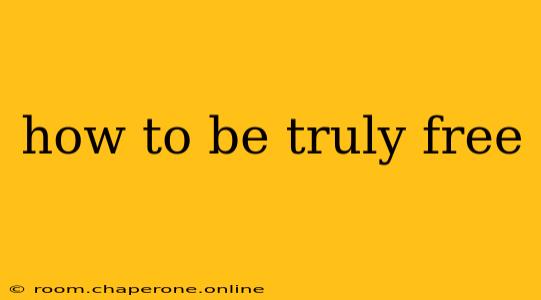The yearning for freedom is deeply ingrained within the human spirit. But what does true freedom actually mean? Is it the absence of physical constraints, financial security, or perhaps something far more profound? This exploration delves into the multifaceted nature of freedom, offering practical steps towards achieving a truly liberated life.
Beyond the Material: Defining True Freedom
Often, we associate freedom with external factors. A high-paying job, a luxurious home, or the ability to travel the world are seen as markers of freedom. While these things can certainly contribute to a sense of well-being, true freedom transcends material possessions. It's about inner liberation—a state of being unburdened by limiting beliefs, fears, and societal pressures. It's about aligning your actions with your authentic self, living a life guided by your values, and experiencing a deep sense of purpose.
Key Pillars of True Freedom:
-
Financial Independence: While not the sole determinant of freedom, financial security provides a crucial foundation. It allows you to make choices aligned with your values, rather than being dictated by economic necessity. This doesn't necessarily mean immense wealth, but rather a comfortable level of financial stability.
-
Emotional Liberation: This is arguably the most critical aspect of true freedom. It involves confronting and processing your emotions, understanding your triggers, and developing healthy coping mechanisms. This journey often requires self-reflection, therapy, or mindful practices like meditation. Letting go of past traumas and limiting beliefs is paramount.
-
Mental Clarity: Cultivating mental clarity involves freeing your mind from the clutter of negative thoughts, anxieties, and distractions. Practices like mindfulness, meditation, and journaling can significantly improve mental clarity and foster a sense of inner peace.
-
Spiritual Connection: For many, a sense of spiritual connection—whether religious or secular—is essential for true freedom. This involves finding meaning and purpose beyond the material world, connecting with something larger than yourself, and living a life aligned with your values.
-
Physical Well-being: Taking care of your physical health is integral to experiencing true freedom. Regular exercise, a balanced diet, and sufficient sleep significantly impact your mental and emotional well-being. A healthy body supports a healthy mind and spirit.
Practical Steps Towards True Freedom:
-
Identify Limiting Beliefs: Take time for self-reflection. What beliefs are holding you back? Are you telling yourself you're not capable, worthy, or deserving? Challenge these beliefs and replace them with empowering affirmations.
-
Practice Mindfulness: Engage in mindfulness exercises daily. Pay attention to your breath, your senses, and the present moment. This helps to quiet the mind and reduce stress and anxiety.
-
Set Clear Goals: Define your values and establish clear, achievable goals that align with your purpose. This creates a sense of direction and purpose in your life.
-
Cultivate Healthy Relationships: Surround yourself with supportive and positive individuals who uplift and inspire you. Let go of toxic relationships that drain your energy.
-
Embrace Imperfection: Perfectionism is a major obstacle to freedom. Embrace your flaws, learn from your mistakes, and allow yourself to be human.
-
Live Authentically: Be true to yourself. Don't let societal expectations or the opinions of others dictate your choices. Live a life aligned with your values and passions.
Conclusion: The Journey to True Freedom
The pursuit of true freedom is a lifelong journey, not a destination. It requires consistent self-reflection, effort, and a commitment to personal growth. By cultivating inner peace, emotional intelligence, and a deep sense of self-awareness, you can unlock your potential for authentic liberation and experience a life filled with purpose, joy, and fulfillment. Remember, true freedom lies not in external circumstances, but within your own heart and mind.

